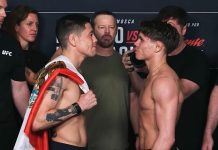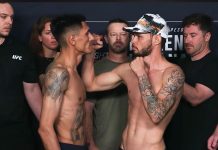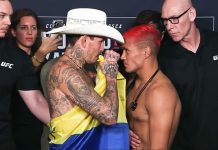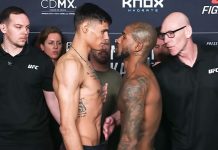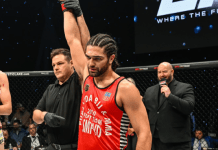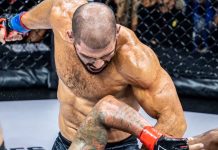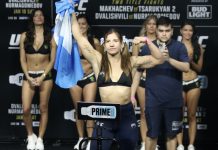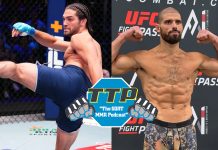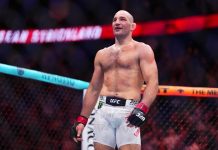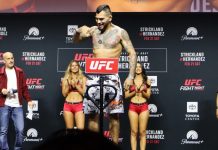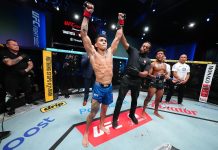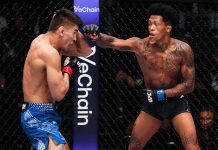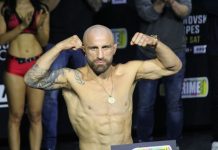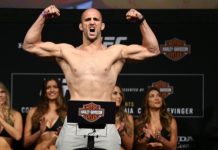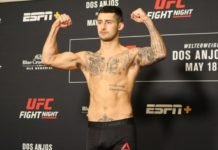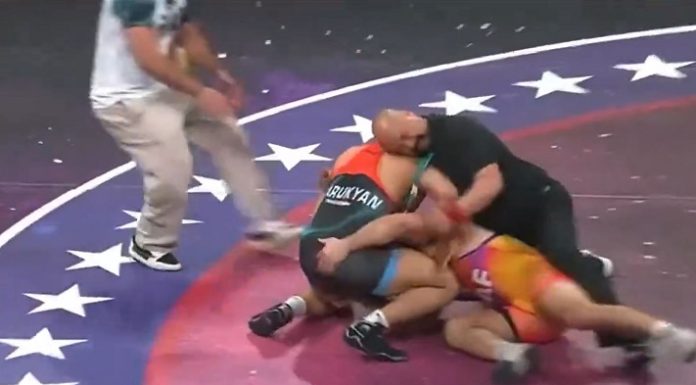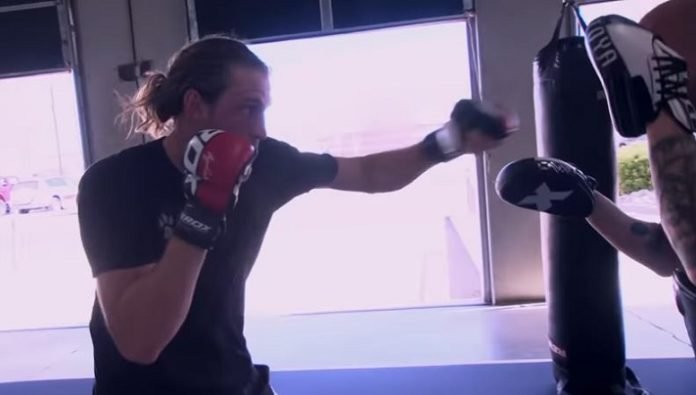
UFC Tampa’s Thomas Gifford gives his side of the story following a tough knockout loss to Mike Davis last weekend.
Thomas Gifford had a rough night at the office at UFC Tampa, suffering a third-round knockout at the hands of Mike Davis. About that, there is little debate.
To many, the fight should have been stopped long before the knockout blow was delivered with fifteen seconds remaining in the third and final round. That has been a subject of debate in the days following the fight. But to Gifford himself, it’s no big thing.
“I’m all good. Everybody’s like all worried about me and stuff. It ain’t no big deal,” he told Cageside Press less than a week after the fight. “Nothing I ain’t been through.”
When he says that, Gifford is talking about more than just the fight business. “Everything I’ve done, I had to fight for,” he said. That’s something that started early. Gifford got into combat sports because of bullying as a kid.
“I got a swirlie and kids were picking on me, and they pushed me in the trash can at lunch,” he revealed. “Just a whole bunch of stuff added up, and I was like ‘you know what, I’m going to learn to fight.’ And I told my dad about it, and he got me into boxing.”
His combat sports journey “started when I was 13, and I’ve had maybe 60 or 70 boxing matches, amateur. And then I had maybe 10 to 15 as an amateur in MMA, and now I’ve gotten almost 30 pro, and I’ve had I think maybe 5 or 6 pro boxing matches.”
In other words, Gifford has had plenty of cage and ring time. Which is why his breakdown of the fight and it’s aftermath began with “it’s no big deal to me.”
In the days that followed the fight, Gifford was urged to review the bout. “When I watched it, I was like ‘what is everybody freaking out about?'” he said. As an example, he pointed to a recent featherweight title fight. “Look at Brian Ortega against Max Holloway. They went five, five minute rounds. And [Ortega] was getting battered up the last three rounds. He wasn’t landing barely landing any punches, he wasn’t doing no good. They didn’t care about him.”
“They didn’t care that he took 200 plus shots to the head,” he continued. In comparison, he pointed out, “I only took 150. That’s less to me than I’d ever taken in a fight. He missed more in the second and third round than he did in the first. Everybody, they wasn’t looking at that.”
The numbers do bring up questions. How many strikes, how many significant strikes, is too many? Is there a metric, or is it just a gut feeling? For Gifford, it’s something less tangible. While fans and pundits were worried about the way he looked and the way the fight was going, Gifford suggest you go back and look at all his old fights.
“My head never stops moving,” he pointed out. “Even if they hit me with a hard uppercut or they hit me with a hook, I turn with the punches, I give with the punches. I don’t try to grit my teeth and bare down on it. That’s how you do get knocked out.”
Gritting your teeth and bracing for impact, he explained, actually results in taking more damage than “rolling off the punches, or if they had just knocked your head back.”
“Yeah your eyes get rolled around the back of your head and stuff and of course it’s bad for your brain,” he admitted, “but I was rolling with the punches. I wasn’t just letting my face just take them full-force. There was a little bit of force taken off by the way I was moving, the way I do it.”
Gifford has been told in the past by one boxing trainer to “roll with those punches. If you can’t take them, roll with them. Take some of the edge off them.” The uppercuts from Davis were hard, Gifford admitted. And the knockout was something he takes responsibility for. “I probably grit my teeth and set my feet, next thing you know, I’m knocked out. That was my fault. Of course, I should have moved my head, I should have used more foot movement.”
But ultimately, he’s a move-forward, roll with the punches fighter. And that’s what he did.
Gifford also admits that he wasn’t ready for Davis, given the short-notice nature of the fight. Davis had stepped up on four days notice to replace Contender Series alum Brok Weaver.
“He hit hard, he was super fast, and I wasn’t prepared for that,” Gifford told us. “Because I’d been training for Brok Weaver. Brok Weaver will never be as fast as Mike Davis, I don’t care if he sees this or not. But that dude is severely fast, and he has severely good techniques and boxing skills that I wasn’t prepared for.”
“I was fully prepared to fight Brok Weaver, and then I had the switch-around,” he stated. But for a number of reasons, he was not about to turn down the fight.
“I have no money, I need this opponent, I’ve been looking forward to fighting, and it’s four day’s notice, there’s no time to back out,” said Gifford, rattling off the list of reasons why the fight had to move forward. “There’s no question in backing out to me. I still signed the contract, and I will sign the contract against Davis. I’ll fight Davis again, it’s no big deal. I will be more prepared for him this time then I was last time, of course. But if I would have trained five or six weeks for Davis like I did Brok, it would have been a totally different story, and I would have been prepared for more than what I was.”
Watch our full interview with Thomas Gifford above, covering more topics, including how Golden Eye and Fortnite are related.

